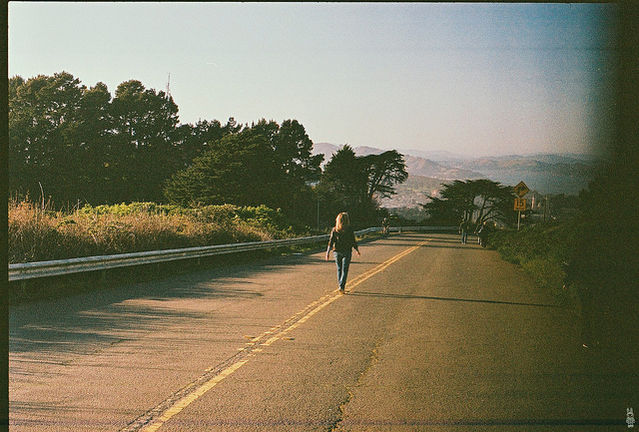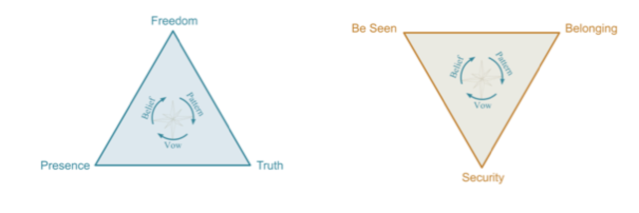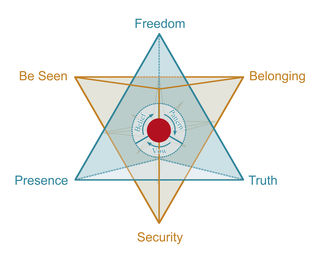
Relationships
Staying Open to Life despite Losses
On the practice of vulnerability
Posted May 9, 2017
When I sat down to count the number of times that I lost a friendship by actions of another, I didn't imagine I would reach the number 29 in the last 27 years, almost all of them close friends, or other people with an ongoing connection, who chose to sever contact with me. Each a story of its own. Some with reasons I understand. Some without any reason ever told to me, though surely with a reason that made sense to that person. The worst was a condensed period of two years during which I lost seven of seven close friends, and then had no new ones for more than six years. The most recent last month, during my visit to Israel, one of the extremely few people in my life I was sure beyond any doubt was a friendship for life. No more.

I decided to write about it when a friend who heard about it wrote: "Wow. Just Wow. It's a miracle, and a testament to your tenacity, that you continue to trust and to open your heart." Even though I know that such cutting off is traumatic, and that I have endured most likely a higher-than-usual rate of these, reading this response I realized more strongly that what I was doing, how I was responding to life, was perhaps something useful to reflect about publicly. Specifically, a look into what is making it possible for me to trust and open my heart, and how far does this openness go.
Why Framing Matters
One of the fundamental insights of Nonviolent Communication (NVC), my spiritual and political home of sorts, is that what happens isn't in any simple way what causes our reaction. Our reaction emerges from what we tell ourselves about what happens. I have watched this, studied this, and worked with people about it long enough to recognize this insight as a life-saver. It brings freedom to the inside, because I am continually reminded that I have no way of knowing what is true inside another person that leads them to actions that I may not like. Fully accepting the humility of not knowing leaves me with much more choice in what I tell myself about other people. The labels I may assign to them are mine, not simple truths about life. The vivid conviction I have about what motivates their actions is also mine, and says at least as much about me as it does about other people. In the absence of the futile search for who is to blame for what I am enduring, or for certainty and truth about others' inner landscape, I am now free to take full ownership of my own inner landscape, critically examine its contents, and choose what I say to myself and where I put my attention.
There are no choices without consequences, and this holds true for this kind of choice, too. The stories I tell myself can open my heart or close it; can lead me to walk towards life or to run away from it; and, even, can offer me a path to a new identity of a powerful, alive, and open person. NVC provides a template story, a framework for making sense of life, that supports me in showing up in the very way I want, in line with my values, which include care for self, others, and the whole.
Because the story of my losses is so dramatic, I want to use it to illustrate this rather complex point. I imagine that any of you reading this asked yourself why so many people have made this repeated choice to exit my life. Of course you do. We all want to know the why of everything, from the moment we discover that the question exists, and forever unless curiosity is rooted out of us. Wanting to know why is never an issue for me. What I mourn is the that our civilization habituates us to answer the "why" of human relationship often with pointing fingers at who's to blame for what happens. In this frame, the more people choose to exit relationships with me, the more "evidence" it provides that there is something fundamentally "wrong" with me that leads one person after another to move away from me. The only alternative to there being something wrong with me is some elaborate way of painting me as a victim, helpless in the hands of so many people who treat me without care.
The other frame that NVC offers is that in this case, as in all human affairs, actions are expressions of needs. Good and bad dissolve into a different perspective, one in which more and more awareness of needs can lead to more choice, more care, more integrity. I'm all in. Neither I nor 27 people who made specific choices in relation to me are good or bad. We all have the same needs, and they contain the code that can help me decipher this drama.
As my sister Arnina has identified and now teaches, needs often cluster, and there are two core clusters that are pivotal to who we become. One is the cluster of security, which also includes belonging and being seen as essential needs, and the other is the cluster of freedom, which also includes truth and presence. The tragedy of socialization within the patriarchal world we live in is that the two triangles polarize. As children, our security triangle is not a given; we have to earn it by being obedient, "good", and overall following adults' ideas and instructions. This means we get a subtle and profound message that says that the price of security and belonging is loss of the freedom to be. The overwhelming majority of us accept this extremely difficult deal. We give up who we are, our truth as it lives in us moment by moment, for the hope of being seen and accepted as part of the whole. We conclude that freedom is impossible, and keep longing for it.

A very small minority of us, in the same circumstance of polarization, choose freedom knowing full well that this means living without safety, belonging, or being seen. I am one of them and as such I can tell the story. It's really not fun. Not that giving up on freedom and authenticity is any fun. It's just that the longing for freedom is so huge, that I often find people who believe that because I have retained freedom I have a better deal. I am not wishing to compare notes. The solution I want is to eliminate the fundamental requirement to choose one or the other. I want us all to have both.
And I chose freedom, accepting the price of not belonging. And that, as Robert Frost's endlessly famous line states, has made all the difference. Yes, I live with a lot of inner freedom. I follow my own convictions and adhere to my own values. I have worked pretty relentlessly for many years to release shame, and am pretty close to my ideal of being 100% shameless. I have reached a great deal of inner peace and I enjoy being me, within me. The cost may not be so apparent. Perhaps the cost is, precisely, the high rate of loss in human relationships.
This reframe helps because it brings me to tenderness. For myself, it's tenderness for the choices I made, who I have become, and the agony of the price. For others, those who have left relationships with me, it's tenderness for their longing for freedom and authenticity, and for the discomfort that I imagine them experiencing with my ways of being which are so often at odds with societal norms.
Tenderness allows me, to some degree, to remain soft-hearted towards the losses. It's a softness that partakes of mourning, gently. With that, I can continue to open myself to each new person with unself-conscious willingness to imagine new possibilities, something different from older relationships.
Surrendering to Vulnerability
Being different from others, and being criticized and often shunned for it, has been excruciating. Although I was tracking only losses since I moved to California in 1989, the trail of losses begins with early childhood.
Given that I wasn't going to respond by giving up on freedom and accepting instead what others wanted from me as the price of belonging, the only other option I knew was protection and a fierce and rather desperate independence. It was always, in my internal landscape, up to me to look after my own needs, because I had little trust that anyone else would care enough about me to want to offer support or assistance. I never saw any reason to speak my needs. I lived as an internal engineer, figuring out what I can do to walk between the drops and manage an existence on the margins.
What I gradually came to see was that I was consistently protecting myself without choice. Whenever I was out of strategies for how to care for myself without imposing anything on others (that has always been my clear commitment), I got lost in helplessness. In those moments, which still happen from time to time, though way less often, I sadly respond abruptly, in ways that are clearly unpleasant to others, in ways I would rather not respond. And not by choice.
It is easy for me to see that this protection kept me separate, inaccessible, and could easily contribute to at least some of the choices that people made to sever connection with me.
Then, in 1996, I adopted the practice of vulnerability. The result has been a dramatic softening that has come through increasing choice and releasing protection. The practice consists, precisely, of choosing to continue to reveal myself - my feelings, my struggles, my needs, what I want others to do - even when I don't trust it will be received.
As the practice has deepened and become more integrated, and my awareness of my internal landscape and of choices within it increase, I have also grown in self-acceptance and self-love. Paradoxically, this has allowed me more choice in being myself, and doing it softly. Not in defiance, simply in being.
In short, the practice of vulnerability has given me peace and less helplessness; it has given me more freedom to be myself in a simple way; and it has made me more accessible.
Because of this practice, I can remain open hearted even in the face of repeated trauma, because the practice in unilateral and unconditional, nourished only by my commitment and the exquisite benefits I get from it.
I believe the practice of vulnerability is one of several that can bridge the two need triangles, regardless of which of the two we gave up early on. As we move towards more and more integration, we have the option of reaching a unique destination that Arnina calls the star of life.

When integrated, our presence is connected with being seen, our truth is no longer at odds with belonging, and we can experience freedom and security at the same time. This may be as close to heaven as we can get in this tortured world.
In my own journey, deepening my practice of vulnerability has brought me, in addition to the softening around my freedom and ways of bringing what is true in me outward, unexpected bounty in terms of human connection and belonging. It's been painstaking and hard won, and yet it's now true, no matter how much my eleven years old self would have been unable to believe: I have a circle of people who love and support me and with whom I experience belonging; people who don't just tolerate me, as I always feared people did; people who enjoy who I am and thrive in their connections with me. Yes, there is no forever, and there may still be those who will choose to leave, and it doesn't take away from the enormity of the shift.
Another unexpected outcome of the practice is discovering new layers of freedom that are available within this new sense of belonging and affirmation of myself. This is freedom to seek, learn, and share with the world beyond any limit I might have feared was there. I've adopted for myself a goal of becoming progressively more radical and less alienating, and I see that the more I soften, the more I am able to bring my full, vibrant, radical, subversive self while alienating fewer and fewer people. With the strength of my own vulnerability and the love and acceptance that surround me, I am less likely to freeze in fear, and more likely to act in ways that are aligned with my vision for the world, with my purpose for being here as I understand it, and with the values I hold most dear.
Joy
The final impetus for writing this piece came when I read the recent article by Oren Sofer that was posted along with the BayNVC bulletin - Giraffe Juice: The Necessity of Joy. What struck me more than anything was the idea that access to joy is tied to "one basic capacity: the ability to receive. To feel joy, we must be willing to let things in, to allow ourselves to be touched by life."
Reading this was the moment I understood even more deeply the devastating cost of the losses I have endured. While I have been able to grow my capacity for outward vulnerability - the acts of allowing others to see my inside - I have continued to protect something within me in terms of inward vulnerability. My resilience and capacity to keep going depended on protecting myself from what came from the outside. I was living without joy, most of my life. While I found ways of making my vulnerability unconditional, a way of living, that very unconditionality made me impervious to what comes my way. In this time of such clear departure from the trauma of my childhood, such harvest of so many years of practice, and so much that aligns with what I want for myself, I feel readier than ever to release the self-holding underneath my entire practice, and to surrender to new frontiers of not knowing, allowing life to carry me instead of me carrying myself. In moments when I can do that, I can feel the stirrings of true, simple joy, the delight of being in this mystery called life, and living it in full.
Image Credits: top: Walking Away, Twin Peaks, San Francisco, CA, by Sunny Lapin, Flickr, (CC BY-SA 2.0). below: three diagrams, by Arnina Kashtan, with permission.



